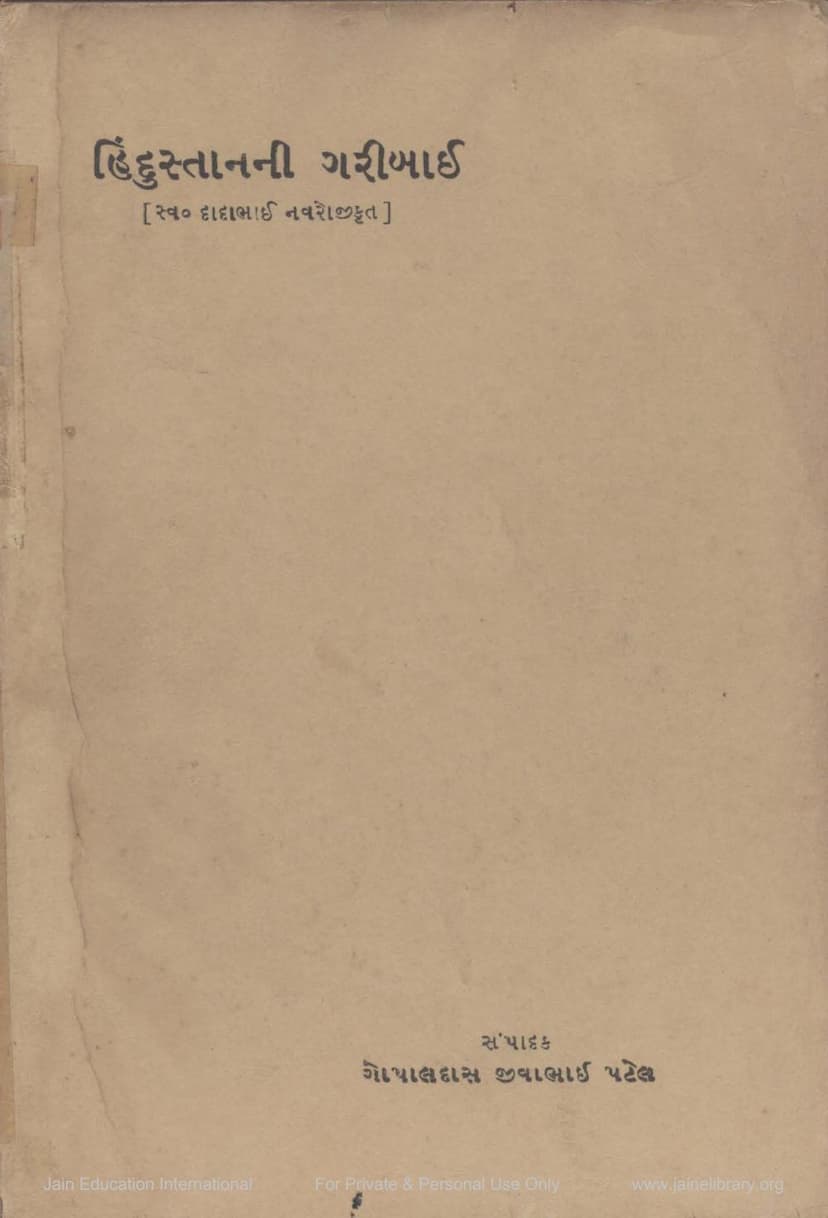Hindusthanni Garibai
Added to library: September 1, 2025

Summary
This document is a Gujarati translation of Dadabhai Naoroji's seminal work, "Poverty and Un-British Rule in India." Titled "Hindhusthani Garibai" (The Poverty of Hindhustan), it was edited by Gopaldas Jivabhai Patel and published by Gujarat Vidyapith, Ahmedabad, in November 1938.
The book is presented as part of the Acharya Gidwani Smarak Granthamala-3. The catalog link provided is: https://jainqq.org/explore/005195/1.
Here's a comprehensive summary based on the provided text:
Core Argument and Context:
The central thesis of the book, mirroring Naoroji's original work, is that British rule in India is oppressive and destructive for Indians, and ultimately detrimental to Britain itself. The author argues that the current economic system established under British rule is the primary cause of India's poverty and ruin. The book aims to present a stark picture of the economic transformation that occurred in India after the advent of British rule, positioning Naoroji, along with William Digby and Romesh Chandra Dutt, as pioneers of modern Indian economics.
Structure and Content:
The book is divided into two main parts:
- Part 1: Sections 1-13 (Core Content): This section details the arguments and evidence presented by Naoroji. The table of contents reveals the thematic progression:
- Introduction (Mandhan): Sets the stage for the book's premise, emphasizing the exploitative nature of British rule and its negative impact on India. It highlights the importance of India to the British Empire.
- Poverty of Hindhustan: Discusses the widespread poverty.
- Economic Drain of Hindhustan: This is a crucial theme, detailing how wealth flows from India to Britain without commensurate return.
- Burden of Taxation: Examines how taxes are levied and their impact on the populace.
- Rising Prices: Analyzes the increase in the cost of goods.
- Gold and Silver: Discusses the flow of precious metals.
- Railway and Other Construction Works: Critically assesses the economic impact of British-funded infrastructure projects.
- Breach of Promises: Highlights the broken promises made by the British government to the Indian people.
- Responses to the Indian Minister's Office: Details Naoroji's arguments and rebuttals against criticisms.
- Fair Allocation of Expenses: Argues for a just distribution of the costs of governance.
- Currency and Exchange: Addresses issues related to India's monetary system and its exchange with Britain.
- Remedies: Proposes solutions to address the economic distress.
The introductory sections (Pages 11-23) provide early insights, quoting Lord Curzon and Lord Roberts on India's importance to the British Empire. They also present damning excerpts from East India Company records and letters from Lord Clive, detailing the corruption, greed, and atrocities committed by early British officials, setting a historical precedent for the ongoing exploitation.
Naoroji's meticulous calculations and data are presented, highlighting the significant annual drain of wealth from India, which was significantly larger than earlier estimates. The book criticizes the unreliability of official statistics and the flawed methodologies used to calculate economic indicators.
Key Themes and Arguments Elaborated:
- The "Drain of Wealth": This is the central pillar of Naoroji's argument. The book quantifies the massive outflow of wealth from India to Britain, through salaries of officials, profits of British businesses, interest on loans, and remittances. This drain, Naoroji argues, is the primary cause of India's perpetual poverty and inability to industrialize or prosper.
- Un-British Rule: Naoroji argues that the rule in India is not "British" in the sense of being just, fair, or beneficial to the ruled. Instead, it is characterized by exploitation and self-interest for Britain.
- Critique of British Economic Policies: The book systematically dissects various British economic policies, including taxation, currency management, railway development, and the administration of justice, demonstrating how they primarily served British interests at India's expense.
- Broken Promises and Disregard for Indian Welfare: Naoroji highlights the consistent failure of the British government to uphold its promises of fair treatment and participation for Indians in their own governance and economic development. The treatment of qualified Indians in civil service and engineering roles is presented as a prime example of systemic discrimination.
- The Importance of Indigenous Rule and Institutions: The book advocates for a greater role for Indians in their own governance and the revival or reform of indigenous institutions, drawing parallels with the relative success of some princely states that were not under direct British administration. The example of Mysore is used to illustrate how better governance, even with Indian rulers, could lead to economic prosperity and efficient administration without the same level of exploitation.
- The Need for Swaraj (Self-Rule): Implicitly and explicitly, the book champions the cause of self-rule as the only way to stop the economic drain and enable India's genuine progress and prosperity. Naoroji's later speeches and advocacy for Swaraj are rooted in the findings and arguments presented in this work.
Translator's and Publisher's Perspective:
The publisher's note (Page 8) explains the rationale for translating this work into Gujarati, emphasizing that despite being a "century-old economy," the book remains relevant. It argues that the economic discussions are not merely about dry statistics but about the "human betrayal" committed by the ruling class. The Gujarati translation is praised for its ability to convey the core message of the original work in simple language, making it accessible to a wider audience. The inclusion of a short biography of Dadabhai Naoroji by N. Parekh is also noted as adding to the book's utility.
Overall Significance:
"Hindhusthani Garibai" (The Poverty of Hindhustan) is presented as a foundational text for understanding the economic critique of British rule in India. It brought forth powerful arguments and data that fueled the Indian nationalist movement and influenced generations of Indian leaders and thinkers. The Gujarati translation makes this vital historical and economic analysis accessible to Gujarati readers, contributing to a deeper understanding of India's struggle for self-determination and economic justice.